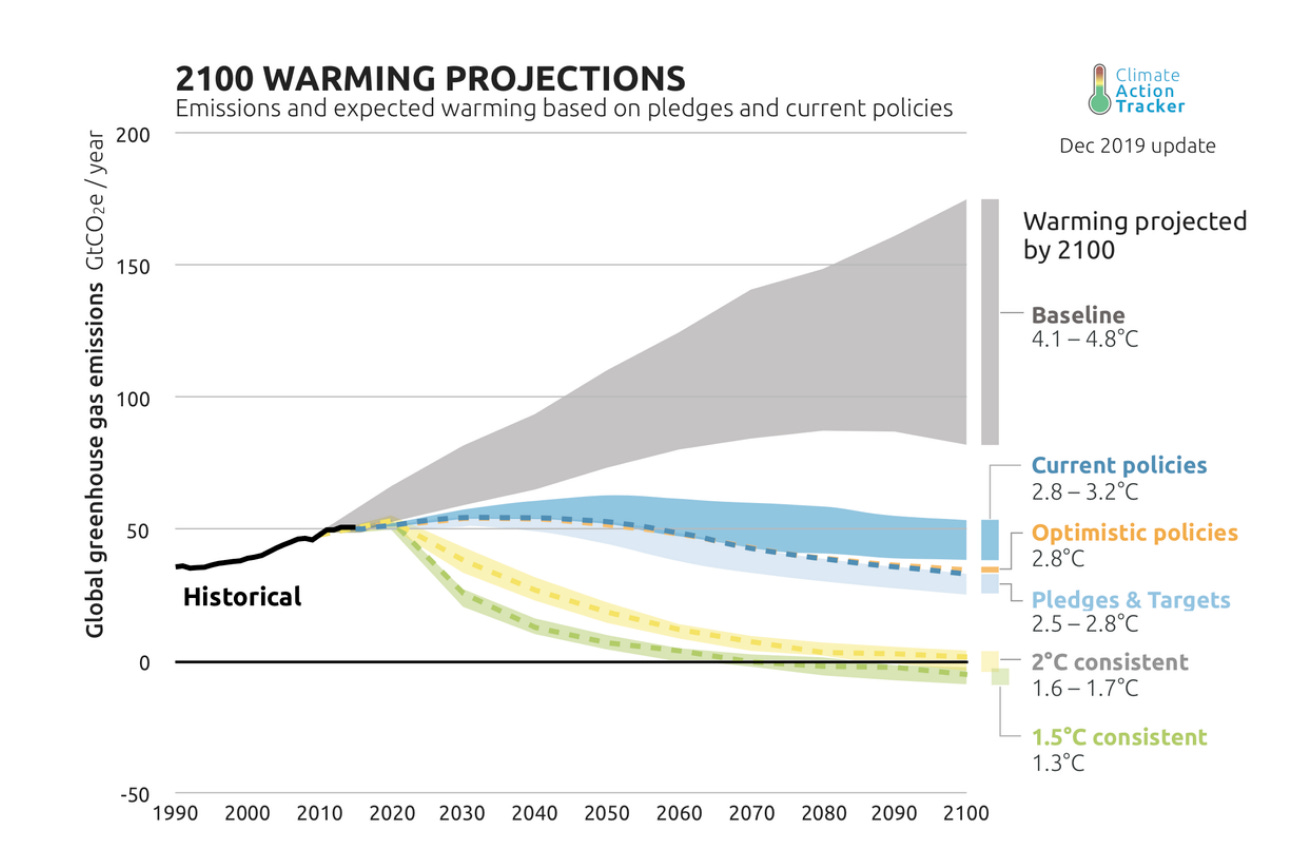
I was sitting with friends recently (outside, two+ metres apart), and one mentioned the coronavirus emissions reductions, how small they were considering so much of the world had ground to a halt. Despite a reduction in fossil fuel use the International Energy Agency calls “unprecedented,” we’re only on track for emissions to drop 8% this year. Given the scale of the problem, we’d have to drop 8% every year in the next decade to keep warming under 2 degrees from pre-industrial levels and avoid the most catastrophic effects of climate change.
So . . . are we hopelessly fucked? Is carbon production so locked in to our system that nothing matters? Instead of washing out my freezer bags should I just straight-up burn them because climate change is basically an asteroid hurtling toward Earth, with no rag-tag gang of oil drillers turned amateur astronauts to save us?
Let’s take a deep breath. First, we need to keep in mind that the coronavirus emissions reduction was a byproduct, not a goal. If you ran a mile when you were chased by wolves, you wouldn’t assume that was the only running you could do and you could never run a marathon. You’d could train, plan, gather support, adjust your diet, then crush that 42.2 with nary a wolf in sight.
The coronavirus disruption does reveal some opportunities, though. For example, because coal plants are so expensive to run, and solar and wind are cheap to run, electric companies have been drawing more on renewables — so much so that for the first year ever, the U.S. is likely to use more power from renewables than coal. Compare that to a decade ago, when coal provided half of America’s power.
So how can we replicate this result with a plan? The obvious answer is to shut down climate villain coal, invest in renewables. Trump loves coal like he loves cheeseburgers, so there’s a definite challenge there, but capitalism could be an ally: if coal plants are expensive, and renewables are getting cheaper (the cost of wind has dropped by 40%, and solar by 80%), market forces might drive green gains.
In a time of massive bailouts, we have a chance to make new plans, and aggressively green ones. As we rebuild post-coronavirus, we have a chance to respond and not react, as the mindfulness teachers would say.
The challenge in front of us is massive. Sadly this isn’t the ozone layer, that now-almost-quaint eco crisis of my youth, which appears to be healing (and we didn’t have to give up refrigeration OR hairspray). With climate change, there isn’t one easy lever to pull, or a single clear path forward. Greenhouse gases are embedded in every aspect of our society — we built this city on rock and oilllllllll.
So as we rebuild, rejig, reimagine, we need to do All. The. Things. Noted climate leader Bill McKibben famously wrote that when it comes to the climate crisis, “there are no silver bullets, only silver buckshot.” That’s why this newsletter looks at so many different topics — we need all the approaches, top-down, bottom-up, jump to left, step to the right.
There’s a new tool out of MIT’s Sloan School of Management that lets you see just how much coordinated effort we’ll need to get out of this mess. With En-ROADS you can play Benevolent Dictator of Earth, and experiment with various levers: slowing deforestation, stopping coal projects in their tracks, increasing funding for electric transport, etc. See how far your favourite interventions can take us. It’s well worth taking some time to experiment, and you can get surprisingly granular if you click on the three dots in each category to reveal drop-down menus. With each adjustment you make, you can see the impact on projected warming, which I’ll remind you, is currently on a business-as-usual trajectory of 4.1 degrees Celsius by 2100 — a prospect that straight-up liquefies my insides.

That other curve that desperately needs flattening.
If you’ve never looked into what 3 to 4 degrees of warming looks like, take a second to enter the Hellmouth with me, because it’s vital we understand the road we’re on. By the time today’s children are getting ready to enjoy their retirement, every summer will bring deadly heatwaves. Drought will be widespread, prompting mass migration from virtually unliveable equatorial regions and likely war. Hundreds of cities will be under water. With the oceans acidified, coral reefs will be completely dead, and populations of sea creatures plummet. Most low-latitude glaciers will have melted, and polar ice will have passed a crucial tipping point that brings runaway warming and massive ocean rise. We’ll see more violent hurricanes, cyclones, and floods. Mass extinction of plant and animal life is inevitable. We’ll have 11 billion people, and far less land to house and feed them. It’s the stuff of all the disaster movies put together and the Rock isn’t coming to save us.
Are you breathing? Take a moment to come back to that. If that was stressful to read, it should be! It’s more terrifying than watching The Exorcist in a dark basement. (Which I have done, and do NOT recommend.) But we have to look this in the face. We have to see what future we’re currently buying on layaway.
Now, I don’t know about you, but I plan to live forever (you should see how much kale I eat), and that is not the world I want for my golden years. I don’t have kids, but I’m pretty fond of my friends’, and that’s not the world I want for them or their children or my future cats.
En-ROADS shows us just how much we need to do — but it also demonstrates how many tools we have in our arsenal. We’re loaded with buckshot. We just have to pull the trigger.
One thing that the coronavirus has shown us is that we can be nimble, responsive, and courageous. We can combine government action and mutual aid. We can act on the recommendations of scientists. Big things can happen fast. And the great news is that ambitious climate action doesn’t have to destroy the economy, put masses of people out of work, or trap us in our homes. There can be hugs!
Also, this kind of wide-ranging, ambitious, coordinated mobilization happened once before, to great success, in the Second World War. If you want a deep dive on how the lessons of WWII apply to the current climate fight, in September you can check out A Good War, by Canadian public policy researcher Seth Klein. (Full disclosure: I copy edited this book.) The book is smart and comprehensive, and makes a compelling case for how Canada could meet its climate commitments and make a stronger, more equitable society. Because we’re not just trying to avoid disaster, we’re trying to build a better world.
So what can we do when we’re not (at least yet) the Benevolent Dictators of Earth? Talk about climate change regularly. Vote, and push your candidates for greener policies. Write your elected representatives. Divest from fossil fuels. Support bold policy at work, at the gym, at school, at church — wherever you have influence. Execute any of the many action points in this newsletter’s archive. Keep doing the things that give you hope and purpose. We don’t have control over everything, but knowing what we’re facing, why not do as much as possible? Not just because it helps reduce future badness, but because right now it can feel really good to take care of business within your circle of control. Plus, small actions by millions of people = big impact.
Last week, in her insightful, funny climate newsletter Minimum Viable Planet, Sarah Lazarovic distilled the emotional side of the big vs. small change paradigm: “For years I’ve made the argument that we need both incremental and systems change. It’s only over the past few years that I’ve realized we need both of those things within ourselves. We need small discrete behaviour change goals, and larger actions to work towards. Together, they comprise our action pie. Small efforts feel inconsequential without a bigger goal. Sustained efforts feel laborious without quick wins.” Emotionally and practically, combining big and small actions is the way forward.
All. The. Things.
And I’d add: All. Of. Us. I’ve been thinking about the end of Buffy the Vampire Slayer, and how when facing the end of days, the whole world falling into the Hellmouth, it wasn’t all about Chosen One. Even the Buffster couldn’t save Sunnydale solo, let alone the rest of the planet. They needed a whole team of slayers and their allies (even annoying little sisters and former enemies). They needed all the different weapons. They needed creativity, resilience, sacrifice, some good jokes, and a coordinated effort. All. The. Things.
So, no, this global pandemic isn’t giving us the emissions reductions we need. Nor should it. That’s not how we want to get to a more liveable future, and we can’t get to that future on just one road. We need highways, and dirt roads, deer paths and back alleys. And we need people on all those routes, discovering new avenues, pushing forward, helping others along. That’s how we get somewhere worth going to.
TL;DR
Coronavirus policies will likely only lead to an 8% emissions drop this year, but we have seen a shift away from coal and toward renewables.
We need to support green stimulus and infrastructure now: to see what effect different policies can have, check out the En-ROADS simulator.
Avoiding climate devastation by the end of the century means using all the tools at our disposal: policy, infrastructure, innovation, personal change, and more. This is what Bill McKibben calls “silver buckshot.”
Wins of the Week
“So here’s the part where you make a choice. What if you could have that power, now? In every generation, one Slayer is born, because a bunch of men who died thousands of years ago made up that rule. They were powerful men. This woman is more powerful than all of them combined. So I say we change the rule. I say my power should be our power. Tomorrow, Willow will use the essence of the Scythe to change our destiny. From now on, every girl in the world who might be a Slayer, will be a Slayer. Every girl who could have the power, will have the power, can stand up, will stand up. Slayers every one of us. Make your choice. Are you ready to be strong?” — Buffy Anne Summers
Some of the things you’re all doing that are making the world a little bit better:
Beth has dramatically lessened her food waste during quarantine (I’m sure many of you have!) and is committed to keeping it up going forward.
Bryan grew enough basil for pesto (that’s a lot) in an indoor aquarium.
Victoria’s brought reusable rags into the kitchen and slashed her paper towel usage.
I’ve been at this weekly newsletter just over six months now (!) and I’m so grateful you’re still with me. Thank you for reading, writing, and most of all for putting these ideas into action! If this newsy is useful to you, I’d love it if you took the time to like, share, thrust it upon loved ones, etc. Having more people in the fight gives us a better chance at winning it. This eco Scooby Gang is open to everyone. Slay on.

xo Jen
P.S. Green energy has recently been dogged by the straight-toYouTube “documentary” Planet of the Humans, produced by Michael Moore. It is rife with misinformation and logical fallacies, and lots of smart people have debunked it. If anyone brings it up, waste no time telling them they’ve been hosed. We have enough to worry about without that noise.



